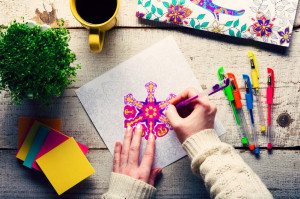Managing stress with mindfulness
 There’s no doubt about it: Mindfulness can be a powerful health and wellness tool. And it’s more accessible than ever before. Calm, Headspace and other apps have brought the concept to the forefront in recent years. It’s easier now than ever to hone this skill, and all it takes is a few minutes a day to get results.
There’s no doubt about it: Mindfulness can be a powerful health and wellness tool. And it’s more accessible than ever before. Calm, Headspace and other apps have brought the concept to the forefront in recent years. It’s easier now than ever to hone this skill, and all it takes is a few minutes a day to get results.
Or maybe apps aren’t your style. That’s ok! There are other ways to re-center and refocus that don’t require a lot of time or effort. Here are a few you might try:
Be more present: Do you find yourself zoning out and looking at your phone during in-person conversations with a friend? We’ve all been there. That’s called phubbing and it can harm relationships. Challenge yourself to keep your device in your pocket and maintain eye contact during the exchange. Your friend will appreciate your undivided attention and return the favor. Besides, it’s just the right thing to do. Trying limiting the number of times you multitask in your daily life, especially when you’re communicating with friends and loved ones, who deserve your undivided attention.
Create: Science tells us that engaging in activities that require the use of the right side of the brain can help us tap into creativity and innovation we didn’t know we had. For example, the mere act of coloring in a coloring book designed for adults can be a way to detach in a healthy manner and unplug from life’s stressors. The same goes for other arts and crafts pursuits, like sewing, knitting, jewelry making, etc. Find what speaks to you and carve out space for it when you can.
Sleep: There’s no substitute for a good night’s sleep — and the research backs it. It’s well known that the most successful people make a point to get more shuteye. They also tend to be more patient and understanding with their friends and family. If you struggle with falling asleep right away, you might consider creating a calming bedtime ritual that includes guided meditation or listening to some calming music before bedtime. Sleep tracking devices and apps can help you make see patterns and tweak them as necessary for optimal sleep.
Try meditation. It may seem mysterious, but it’s actually quite simple. And research suggests that there’s a whole bunch of benefits to meditating regularly. Here’s a guide to getting started.
Mindfulness may seem trendy, but the truth is, it’s been around for thousands of years. And people need it more than ever with the pandemic weighing heavily on a lot of us. What do you have to lose?






